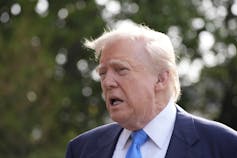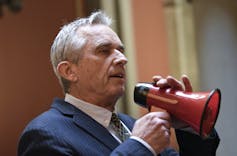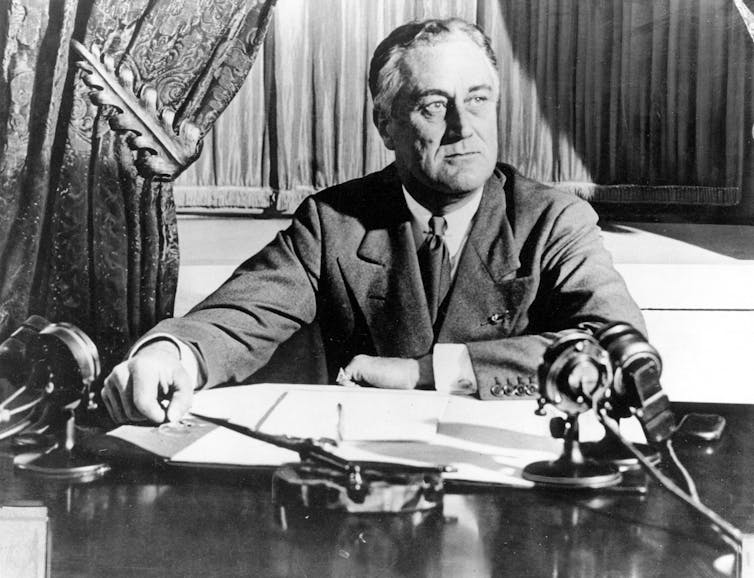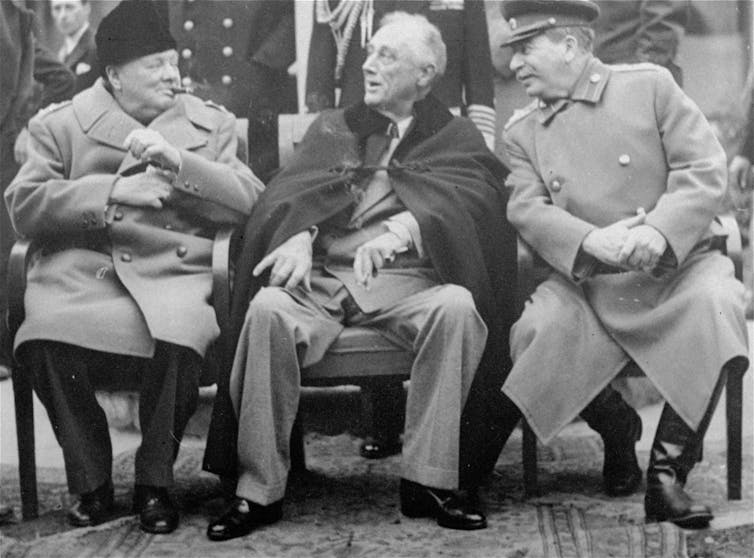Watching United States President Donald Trump weave and chainsaw his way through the first 100 days of his second term in office, I’ve been reminded of what Anthony Eden, the United Kingdom’s foreign secretary in the 1930s and later its prime minister, once said about Franklin D. Roosevelt.
FDR, Eden recalled in his memoirs, was “too like a conjurer, skilfully juggling balls of dynamite, whose nature he failed to understand.”
The image fits the 47th president much better than the 32nd.
The dynamite-wielding Trump
Dynamite has certainly been exploding regularly since Trump took office in January. His actions include:
Read more:
How Project 2025 became the blueprint for Donald Trump’s second term
For non-MAGA enthusiasts, it is easy to surmise — similar to Eden’s remarks on FDR — that Trump does not understand the potential damage of the dynamite he is not just juggling, but hurling.

(AP Photo/Alex Brandon)
A case might be made that some lobs align with Trump’s personal penchant for retribution, or that the chainsaw is being wielded to make room in the federal budget for new tax cuts for the one per cent.
But such calculations disregard deeply rooted American values like respect for the rule of law and the separation of powers.
Trump’s actions could suggest a lust for mayhem apparently aimed at dismantling a century of efforts to shape a government that serves global security while also meeting the economic, social and health care needs of American citizens, including safety net provisions for senior citizens, children, farmers, veterans and others.
Threats today, damage tomorrow
His apparent fondness for dynamite is already having negative consequences, with seemingly little grasp of the likelihood of worse to come: today, he’s upending the lives of civil servants; tomorrow’s disruptions will likely include an attack on the services provided by agencies like the Social Security Administration and disruption of the flow of funds to many poor school districts.

(AP Photo/Hans Pennink)
Today, the U.S. is struggling with a measles outbreak. But the personal beliefs of Health and Human Services Director Robert F. Kennedy, Jr., a notorious vaccination and public health skeptic, doesn’t bode well for a fight against a rapidly evolving avian flu threat on the near horizon.
Today’s stock and bond market volatility creates the possibility of a trade war catastrophe and damage to economic stability as the U.S. appears poised to disregard its longtime status as the world economy’s “safe haven.”
The current tensions in what were once ironclad partnerships with allies that include Canada, the European Union and Ukraine — along with the whiplash reversal of American-Russian dynamics — are reminiscent of the global disruption in the 1930s that featured the Great Depression and the eruption of the Second World War.
How FDR coped with explosions around him
If Eden’s image of FDR as a dangerous juggler of dynamite might also apply to Trump, it fails to capture the essential attributes of the 32nd president’s White House career. Eden’s ego seems to have undercut his appraisal of FDR — compounded by his own failure to understand the historical developments that profoundly weakened the British Empire and brought his own career to an end.
There’s no question dynamite was exploding in 1933, the start of FDR’s 12 years in the White House. But the Depression and its evolving consequences, not FDR’s personal impulses and misconceptions, created a tinderbox decade.
One of Roosevelt’s great strengths, in fact, was his ability to recognize the acute dangers emanating from a fearful cortege of flaming fuses. Another was his success in turning insights into meaningful actions.

(AP Photo)
Roosevelt knew — far better than his predecessor, Herbert Hoover — that the onset of the Depression would require dramatic actions and fundamental reforms.
His New Deal expanded the government’s role in stimulating the economy (for example, the Public Works Administration), regulation (the Securities Exchange Commission), social welfare initiatives (the Social Security program) and infrastructure development (for example, the Tennessee Valley Authority).
The Depression wasn’t fully eradicated — that didn’t happen until after war broke out — but the lives of millions of Americans still improved significantly.
Of equal importance, FDR’s creative thinking and government transformations created building blocks for further post-war reforms, including Lyndon Johnson’s Great Society efforts three decades later.
Read more:
The Great Society: the forgotten reform movement
Roosevelt also knew that the devastation of the Depression and the unparalleled destruction of the Second World War required a transformation of the global arena. He believed technology — air power especially — had created an integrated world. In his January 1943 State of the Union address, he said:
“Wars grow in size, in death and destruction, and in the inevitability of engulfing all nations, in inverse ratio to the shrinking size of the world as a result of the conquest of the air.”
Sharing responsibilities
FDR believed the world he worked to create would be safer and more prosperous because multilateral organizations would encourage greater emphasis on shared resources and responsibilities. The United Nations, the International Monetary Fund and the World Bank took shape during FDR’s presidency — as did long-term plans for decolonization and human rights initiatives.
Roosevelt knew too — better than many of his White House successors — that the U.S. needed to share leadership responsibilities. He believed emphatically in multilateralism, recognizing the limits of American resources and power, and the pragmatism of compromising with the priorities of others, whether they were powerful states or colonial peoples.
His “Four Policemen” approach to maintaining peace — comprising the U.S., the U.K., the Soviet Union and China — would sometimes create unpalatable situations. He was criticized harshly, for example, for naively opening the door to Soviet domination of eastern Europe via the Yalta agreement. Nonetheless, FDR focused on efforts he believed would avert another destructive cataclysm.

(AP Photo)
FDR was an imperfect leader in various ways — in not appreciating, for example, how global leadership could result in arrogance. He did, however, understand the explosive domestic and international developments of the 20th century and sought constructive solutions to grave challenges.
Trump, on the contrary, is seemingly prioritizing destruction over construction. Propelled by a “move fast and break things” mantra, there’s little evidence that he understands its pain nor the damaging consequences of his impulses.




